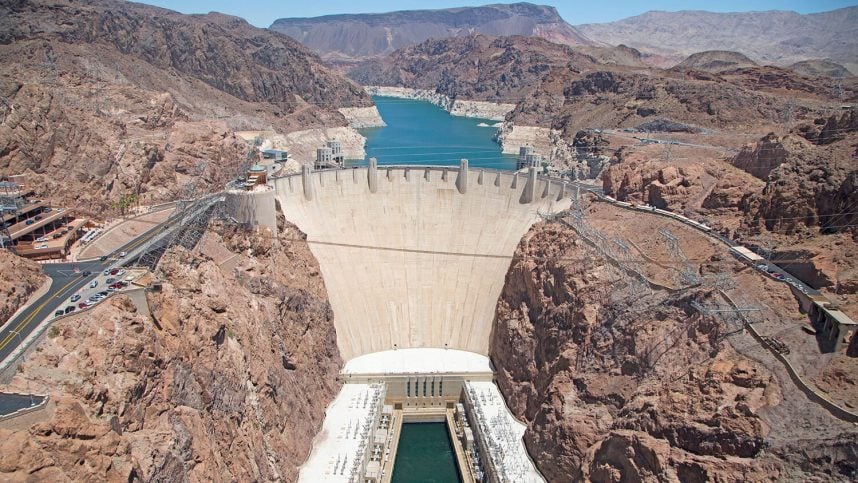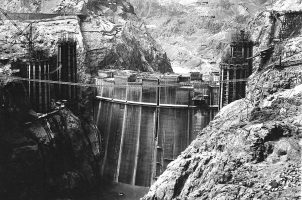VEGAS MYTHS RE-BUSTED: Hoover Dam Bodies
Posted on: December 15, 2023, 08:04h.
Last updated on: December 17, 2023, 11:33h.
EDITOR’S NOTE: “Vegas Myths Busted” publishes a new entry every Monday, with a bonus Flashback Friday edition. Today’s entry in our ongoing series originally ran on July 22, 2022.
A surprising number of alternative facts about the world’s gambling capital continue to resonate across pop culture, with little relevance to reality. The Hoover Dam holds one of the biggest.

Construction of the Hoover Dam in the 1930s was dangerous work; as such, there were many fatalities. But no bodies lie inside the mammoth structure’s 4.4 million cubic feet of concrete, despite what your cousin Josh whispered to you when you toured the facility.
While Hoover Dam was built between 1931 and 1936, setting the stage for Las Vegas’ eventual transformation from a small town to a big city, about 100 unfortunate construction workers did lose their lives. One was even buried alive in the Hoover Dam concrete, according to former Nevada state archivist Guy Rocha. But his remains didn’t remain there.
The Hoover Damned
On Nov. 11, 1933, the wall of a form collapsed, sending hundreds of tons of wet concrete tumbling down the face of the dam and onto poor W.A. Jameson. When Jameson’s fellow construction workers toiled for 16 hours to exhume him, it wasn’t only to comfort his bereaved family and friends.
There are several logical reasons why workers wouldn’t have been left in the concrete. For starters, the dam is made from many slabs of concrete. Each slab took hours to set before the next could be poured. So, if someone died during the process, there was plenty of time to recover the body.
Secondly, organic material (like a human body) would cause significant issues for the structural integrity of the concrete. As a body broke down, it would create an air pocket inside the concrete. Over time, this would create an unacceptable structural defect that could break up or damage the dam’s integrity, according to Rocha.
Dam Sparks Imagination, Confusion
The myth of Hoover Dam’s entombed owes to how large the structure has loomed over Las Vegas for nearly 100 years.
Hoover Dam was such a massive engineering project that shaped the region so much, it has sparked a lot of people’s imaginations for a long time,” said David Schwartz, Las Vegas historian and UNLV professor.
People may also have confused Hoover Dam with Montana’s Fort Peck Dam. In bad news for anyone trying to get some sleep in the vicinity of that Missouri River structure, the bodies of six of eight workers killed by a catastrophic slide there on Sept. 22, 1938, were permanently entombed inside.
Fort Peck is an earthen dam, so decomposing bodies aren’t considered structural defects, Rocha explained, since the loose earth slowly collapses around them.
Unlike the Hoover Dam, nearby Lake Mead does hold a few morbid secrets. Two bodies were found on its exposed bottom in May, with one suspected to be a mob hit.
Look for “Vegas Myths Busted” every Monday on Casino.org. Visit VegasMythsBusted.com to read previously busted Vegas myths. Got a suggestion for a Vegas myth that needs busting? Email corey@casino.org.
Related News Articles
VEGAS MYTHS RE-BUSTED: Showgirls Still Dance on the Strip
VEGAS MYTHS RE-BUSTED: Howard Hughes Bought Silver Slipper Just to Dim its Sign
VEGAS MYTHS BUSTED: Hoover Dam Was Ever Officially Named Boulder Dam
Most Popular
LOST VEGAS: ‘Tony The Ant’ Spilotro’s Circus Circus Gift Shop
Las Vegas Overstated F1 Race’s Vegas Impact — Report
Mega Millions Reportedly Mulling Substantial Ticket Price Increase
NoMad Hotel to Check Out of Park MGM on Las Vegas Strip
Most Commented
-
End of the Line for Las Vegas Monorail
— April 5, 2024 — 90 Comments -
Mega Millions Reportedly Mulling Substantial Ticket Price Increase
— April 16, 2024 — 8 Comments -
Long Island Casino Opponents Love New York Licensing Delays
— March 27, 2024 — 5 Comments
















Last Comments ( 2 )
My son jumped from bypass bridge facing Hoover Dam but they advised me to do not tell about it due tourists attraction- how many lies we are facing daily in this country, publish a real data please, it is important
I remember hearing stories about scuba divers clearing the damn grates would see catfish as big as a man..